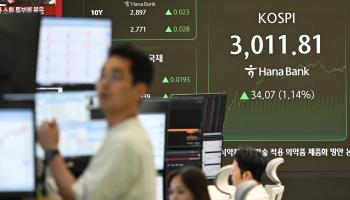Some of the new administration’s recent actions seem at odds with stated goals and could complicate business operations
Since winning June’s snap election, South Korea’s left-leaning President Lee Jae-myung has launched numerous policy initiatives and a sweeping government overhaul. The programme is marked by tensions. Workers’ rights will be expanded, and firms with poor safety records will face stiff penalties. However, Lee has also called for deregulation to assist business, and a plan to lower the capital gains tax threshold has been scrapped. In other areas, such as nuclear power, policy also appears conflicted.
What’s next
Lee’s stated ambition to see the KOSPI stock index breach 5,000 points will require more business confidence. Given slow economic growth, Lee may have to trim some of his left-wing instincts — at the risk of inviting backbench resistance from his ruling Democratic Party of Korea (DPK). Investor sentiment will likely be dented by the recently enacted ‘yellow envelope’ law, which from February 2026 will substantially shift power from employers to workers and trade unions in several areas.
Subsidiary Impacts
- Divisions between Lee and his industry minister on nuclear power will complicate the administration’s policy in this crucial area.
- Ambitious infrastructure plans, including for renewables and rare earths, will further strain Seoul’s already stretched public finances.
- Reforms to weaken the criminal prosecution service and split the Ministry of Economy and Finance (MOEF) could erode governance.
- Seoul’s trade and tariff deal with the United States is yet to be finalised, presenting another downside risk to business confidence.
Analysis
After months of policy drift in the turmoil unleashed by former President Yoon Suk-yeol’s abortive declaration of martial law last year, Lee’s new administration is moving fast (see SOUTH KOREA: Political crisis will damage credibility – December 10, 2024).
The DPK controls parliament, with 166 out of 300 seats. It formerly used this to block most of Yoon’s bills; now, it has begun to enact Lee’s programme. New legislation passed and measures implemented include stimulus initiatives and labour law amendments.
Following the distribution of vouchers worth KRW150,000 (USD108) to all citizens from July, a second handout — of KRW100,000 to 90% of the population, excluding the richest — began today. The first round helped boost consumption and consumer sentiment.
Popularly known as the ‘yellow envelope act’, significant amendments to trade union law were passed on August 24. Effective from February 24 next year, the act includes major provisions:
- Employers are now responsible for workers indirectly hired through subcontracting.
- Non-employees may join trade unions.
- Industrial action will henceforth be allowed to address a wider range of grievances.
- The scope for employers to sue workers or unions in industrial disputes will be narrower.
These changes empower workers and unions but may prove onerous for employers, especially those operating complex subcontracting arrangements.
Workplace safety fines
On September 15, the labour ministry said laws will be revised so that companies which have more than three fatal industrial accidents annually can be fined up to 5% of their operating profit.
Himself a former child labourer with a damaged wrist, Lee prioritises this issue. He aims to cut the industrial accident rate from 0.39 per 10,000 to the OECD average of 0.29 by 2030.
One CEO of a construction firm that had several fatalities resigned on August 5, after Lee threatened to revoke its licence. Punitive fines, as now proposed, are deemed more effective as a deterrent than prosecutions, which are expensive and slow.
Finding a balance
Alongside these pro-worker initiatives have come other gestures more favourable to business.
In Lee’s first policy retreat, the MOEF on September 15 withdrew a plan to lower the capital gains tax threshold on stock holdings from KRW5,000 to KRW1,000. This had angered retail investors, prompting a sell-off in August, and clashed with Lee’s stated goal of pushing the KOSPI index to 5,000 points.
The same day, Lee called for “major reform” of “too many unnecessary” punitive provisions against firms, which inhibit risk-taking and investment. Yet in at least one area, namely industrial safety, Lee is adding more such measures.
Sweeping government reorganisation
Lee also has more far-reaching plans for governmental reform. On September 16, the Cabinet finalised a list of 123 policy tasks and 23 implementation strategies, based on the work of a prior commission.
Implementation will entail passing 110 new bills and revising 66 existing statutes. The government’s ambitious goal is to complete the revisions this year.
The most consequential reform, long debated, is to replace the present single five-year term with a four-year Presidency, allowing re-election for a second term. This move, which has bipartisan support, would require constitutional change and hence a referendum.
The government can use its majority to enact other major changes. Several involve strengthening the legislature. Emergency decrees and martial law declarations, like Yoon’s last December, would in future require prior parliamentary approval (see SOUTH KOREA: Political uncertainty will be prolonged – December 20, 2024).
More contentiously, some major institutions are to be weakened, reorganised or even terminated:
- The Defence Counterintelligence Command and National Police Agency will be abolished.
- The Board of Audit and Inspection, hitherto independent, will be placed under the National Assembly.
- The powerful Supreme Prosecutors’ Office is to lose its investigative functions.
All these measure are politically controversial. Based on past form, the DPK may use its majority to railroad them if the conservative opposition People Power Party does not cooperate.
Economic split
Also controversial is Lee’s plan to reorganise government economic functions by splitting the MOEF.
A new budget ministry under the Prime Minister’s Office will take over budget planning, fiscal policy and long-term debt management.
The MOEF will oversee economic policy and taxation. It will additionally take over financial market policies and regulation from the Financial Services Commission, which is to merge with the Financial Supervisory Service.
Lee’s plan to split the MOEF has attracted widespread scrutiny
A separate budget ministry previously existed from 1999 to 2008. Critics see no merit in reviving this, and fear a loss of efficiency and policy momentum will result.
Economic goals include raising annual GDP growth from 1% to 3%, creating a KRW150tn national growth fund and making South Korea one of the world’s top three powers in AI.
Not mentioned in the government’s strategy are unpopular policy tasks that are widely seen as unavoidable: contributions to the national pension and health insurance schemes, for example, must be raised soon or risk bankruptcy.
Nuclear knot
Policy on nuclear power also urgently needs clarification.
Moon Jae-in, the last DPK President (in office 2017-22), proposed to phase nuclear power out entirely, even though it generates 32% of the country’s electricity. Moon’s conservative successor Yoon (2022-25) reversed this policy, and suspended plant construction resumed.
The new government is sending mixed signals.
On September 11, Lee said more nuclear power plants were inappropriate, citing their multi-year construction schedule. He called instead for massive investment in renewables.
The Lee administration appears conflicted in its support for nuclear energy
However, on September 17 Minister of Trade Industry and Energy Kim Jung-kwan said two new nuclear power plants and one small modular reactor must go ahead to meet future demand. These projects were approved in February, before Lee was elected.
The environment minister, Kim Sung-whan, on September 9 called for a review of new nuclear construction. If Lee’s reorganisation plans are enacted, Kim will become responsible for energy policy.
Moon’s hostility damaged a sector that has long lead times. The latest revival of scepticism is at odds with Seoul’s efforts to promote nuclear as an export sector (see SOUTH KOREA/EASTERN EUROPE: Nuclear deals will grow – October 10, 2024).

A currency dealer monitors exchange rates near a large screen showing South Korea’s benchmark KOSPI stock index (right) at the Hana Bank headquarters in Seoul (Jung Yeon-Je/AFP/Getty Images)
Analyst

Thomas Shipley

